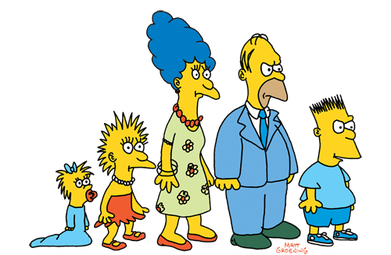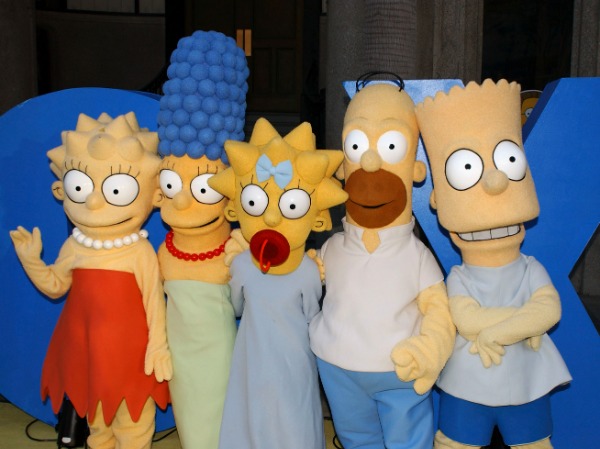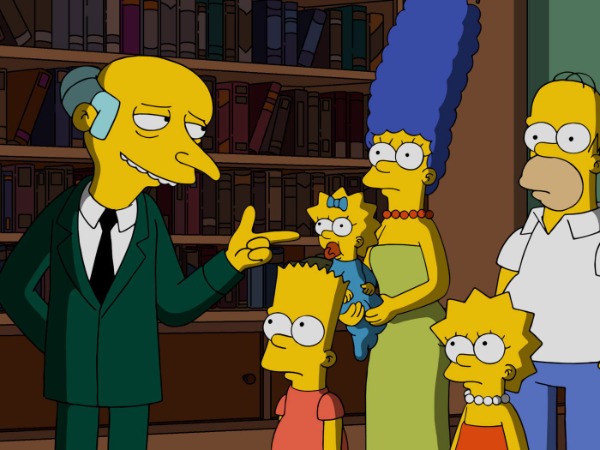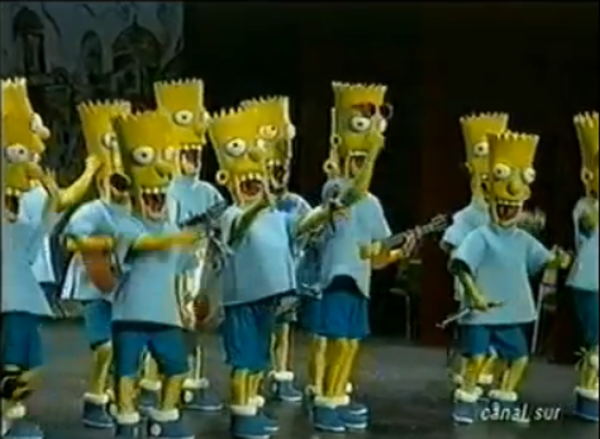Sydney Test Page
What in the heck is "The Simpsons"
The Simpsons is an American animated sitcom created by Matt Groening for the Fox Broadcasting Company. The series is a satirical depiction of American life, epitomized by the Simpson family, which consists of Homer, Marge, Bart, Lisa, and Maggie. The show is set in the fictional town of Springfield and parodies American culture and society, television, and the human condition.
The family was conceived by Groening shortly before a solicitation for a series of animated shorts with producer James L. Brooks. He created a dysfunctional family and named the characters after his own family members, substituting Bart for his own name; he thought Simpson was a funny name in that it sounded similar to "simpleton". The shorts became a part of The Tracey Ullman Show on April 19, 1987. After three seasons, the sketch was developed into a half-hour prime time show and became Fox's first series to land in the Top 30 ratings in a season (1989–1990).
The Simpsons takes place in the fictional American town of Springfield in an unknown and impossible-to-determine U.S. state. The show is intentionally evasive in regard to Springfield's location. Springfield's geography, and that of its surroundings, contains coastlines, deserts, vast farmland, tall mountains, or whatever the story or joke requires. Groening has said that Springfield has much in common with Portland, Oregon, the city where he grew up. The name "Springfield" is a common one in America and appears in at least 29 states. Groening has said that he named it after Springfield, Oregon, and the fictitious Springfield which was the setting of the series Father Knows Best. He "figured out that Springfield was one of the most common names for a city in the U.S. In anticipation of the success of the show, I thought, 'This will be cool; everyone will think it's their Springfield.' And they do."
The Simpsons has six main cast members: Dan Castellaneta, Julie Kavner, Nancy Cartwright, Yeardley Smith, Hank Azaria, and Harry Shearer. Castellaneta voices Homer Simpson, Grampa Simpson, Krusty the Clown, Groundskeeper Willie, Mayor Quimby, Barney Gumble, and other adult, male characters. Julie Kavner voices Marge Simpson and Patty and Selma, as well as several minor characters. Castellaneta and Kavner had been a part of The Tracey Ullman Show cast and were given the parts so that new actors would not be needed. Cartwright voices Bart Simpson, Nelson Muntz, Ralph Wiggum and other children. Smith, the voice of Lisa Simpson, is the only cast member who regularly voices only one character, although she occasionally plays other episodic characters. The producers decided to hold casting for the roles of Bart and Lisa. Smith had initially been asked to audition for the role of Bart, but casting director Bonita Pietila believed her voice was too high, so she was given the role of Lisa instead. Cartwright was originally brought in to voice Lisa, but upon arriving at the audition, she found that Lisa was simply described as the "middle child" and at the time did not have much personality.
Some commentators say the show is political in nature and susceptible to a left-wing bias. Al Jean acknowledged in an interview that "We [the show] are of liberal bent." The show portrays government and large corporations as evil entities that take advantage of the common worker. Thus, the writers often portray authority figures in an unflattering or negative light. In The Simpsons, politicians are corrupt, ministers such as Reverend Lovejoy are dismissive to churchgoers, and the local police force is incompetent. Religion also figures as a recurring theme. In times of crisis, the family often turns to God, and the show has dealt with most of the major religions.
The Simpsons was the first successful animated program in American prime time since Wait Till Your Father Gets Home in the 1970s. During most of the 1980s, US pundits considered animated shows as appropriate only for children, and animating a show was too expensive to achieve a quality suitable for prime-time television. The Simpsons changed this perception, initially leading to a short period where networks attempted to recreate prime-time cartoon success with shows like Capitol Critters, Fish Police, and Family Dog, which were expensive and unsuccessful.
The Simpsons' use of Korean animation studios for tweening, coloring, and filming made the episodes cheaper. The success of The Simpsons and the lower production cost prompted US television networks to take chances on other adult animated series. This development led US producers to a 1990s boom in new, animated prime-time shows for adults, such as Beavis and Butt-Head, South Park, Family Guy, King of the Hill, Futurama (which was created by Matt Groening), and The Critic. For Family Guy creator Seth MacFarlane, "The Simpsons created an audience for prime-time animation that had not been there for many, many years ... As far as I'm concerned, they basically re-invented the wheel. They created what is in many ways—you could classify it as—a wholly new medium."
Critics' reviews of early Simpsons episodes praised the show for its sassy humor, wit, realism, and intelligence.[26][247] However, in the late 1990s, around the airing of season 10, the tone and emphasis of the show began to change. Some critics started calling the show "tired".[248] By 2000, some long-term fans had become disillusioned with the show, and pointed to its shift from character-driven plots to what they perceived as an overemphasis on zany antics.[249][250][251] Jim Schembri of The Sydney Morning Herald attributed the decline in quality to an abandonment of character-driven storylines in favor of celebrity cameo appearances and references to popular culture. Schembri wrote in 2011: "The central tragedy of The Simpsons is that it has gone from commanding attention to merely being attention-seeking. It began by proving that cartoon characters don't have to be caricatures; they can be invested with real emotions. Now the show has in essence fermented into a limp parody of itself. Memorable story arcs have been sacrificed for the sake of celebrity walk-ons and punchline-hungry dialogue."
In 2010, the BBC noted "the common consensus is that The Simpsons' golden era ended after season nine", and Todd Leopold of CNN, in an article looking at its perceived decline, stated "for many fans ... the glory days are long past." Similarly, Tyler Wilson of Coeur d'Alene Press has referred to seasons one to nine as the show's "golden age", and Ian Nathan of Empire described the show's classic era as being "say, the first ten seasons." Jon Heacock of LucidWorks stated that "for the first ten years [seasons], the show was consistently at the top of its game", with "so many moments, quotations, and references – both epic and obscure – that helped turn the Simpson family into the cultural icons that they remain to this day."
The stereotypical nature of the character Apu Nahasapeemapetilon has been the subject of controversy. Indian-American comedian Hari Kondabolu stated in his 2017 documentary The Problem with Apu that as a child he was a fan of The Simpsons and liked Apu, but he now finds the character's stereotypical nature troublesome. Defenders of the character responded that the show is built on comical stereotypes, with creator Matt Groening saying, "that's the nature of cartooning." He added that he was "proud of what we do on the show", and "it's a time in our culture where people love to pretend they're offended". In response to the controversy, Apu's voice actor, Hank Azaria, said he was willing to step aside from his role as Apu: "The most important thing is to listen to South Asian people, Indian people in this country when they talk about what they feel and how they think about this character." In February 2020, he confirmed that he would no longer voice Apu. Groening stated at the same time that the character would remain in the show.
In 2003, about 500 companies around the world were licensed to use Simpsons characters in their advertising. As a promotion for The Simpsons Movie, twelve 7-Eleven stores were transformed into Kwik-E-Marts and sold The Simpsons related products. These included "Buzz Cola", "Krusty-O" cereal, pink doughnuts with sprinkles, and "Squishees".
The popularity of The Simpsons has made it a billion-dollar merchandising industry.The title family and supporting characters appear on everything from T-shirts to posters. The Simpsons has been used as a theme for special editions of well-known board games, including Clue, Scrabble, Monopoly, Operation, and The Game of Life, as well as the trivia games What Would Homer Do? and Simpsons Jeopardy!. Several card games such as trump cards and The Simpsons Trading Card Game have also been released. Many official or unofficial Simpsons books such as episode guides have been published. Many episodes of the show have been released on DVD and VHS over the years. When the first season DVD was released in 2001, it quickly became the best-selling television DVD in history, although it was later overtaken by the first season of Chappelle's Show. In particular, seasons one through seventeen were released on DVD for 13 years between September 2001 to December 2014 in the U.S./Canada (Region 1), Europe (Region 2), and Australia/New Zealand/Latin America (Region 4). However, on April 8, 2015, Al Jean announced that the Season 17 DVD would be the last one ever produced, leaving the collection from Seasons 1 to 17, Season 20 (released out of order in 2010), with Seasons 18, 19, and 21 onwards unreleased. Jean also stated that the deleted scenes and commentaries would try to be released to the Simpsons World app, and that they were pushing for Simpsons World to be expanded outside of the U.S. Two years later, however, on July 22, 2017, it was announced that Season 18 would be released on December 5, 2017, on DVD. Another two years later, on July 20, 2019, it was announced that Season 19 would be released on December 3, 2019, on DVD.

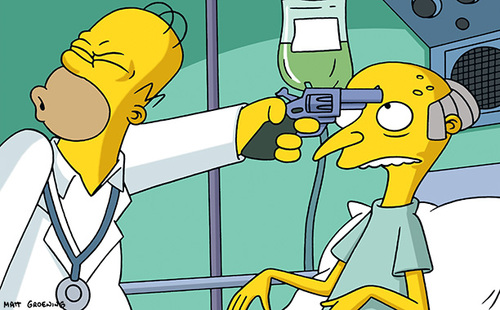



"The Principal and the Pauper" (season nine, 1997) is one of the most controversial episodes of The Simpsons. Many fans and critics reacted negatively to the revelation that Seymour Skinner, a recurring character since the first season, was an impostor. The episode has been criticized by Groening and by Harry Shearer, who provides the voice of Skinner. In a 2001 interview, Shearer recalled that after reading the script, he told the writers, "That's so wrong. You're taking something that an audience has built eight years or nine years of investment in and just tossed it in the trash can for no good reason, for a story we've done before with other characters. It's so arbitrary and gratuitous, and it's disrespectful to the audience."





"The Principal and the Pauper" (season nine, 1997) is one of the most controversial episodes of The Simpsons. Many fans and critics reacted negatively to the revelation that Seymour Skinner, a recurring character since the first season, was an impostor. The episode has been criticized by Groening and by Harry Shearer, who provides the voice of Skinner. In a 2001 interview, Shearer recalled that after reading the script, he told the writers, "That's so wrong. You're taking something that an audience has built eight years or nine years of investment in and just tossed it in the trash can for no good reason, for a story we've done before with other characters. It's so arbitrary and gratuitous, and it's disrespectful to the audience." The show has reportedly been taken off the air in several countries. China banned it from prime-time television in August 2006, "in an effort to protect China's struggling animation studios." In 2008, Venezuela barred the show from airing on morning television as it was deemed "unsuitable for children". The same year, several Russian Pentecostal churches demanded that The Simpsons, South Park and some other Western cartoons be removed from broadcast schedules "for propaganda of various vices" and the broadcaster's license to be revoked. However, a court decision later dismissed this request.


